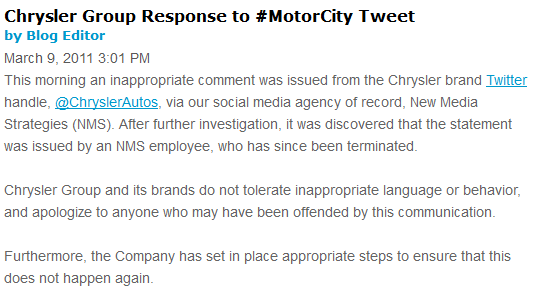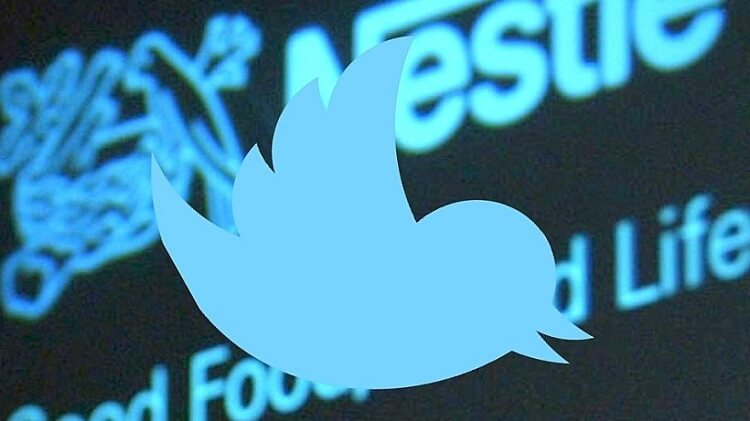More and more companies are embracing social media like never before, taking to Facebook, Twitter and other tools in droves to connect with the customers of tomorrow – but it’s not always so easy.
Businesses that focus only on implementing social media technologies rather than on how to use social collaboration for business success often fail.
Some recent examples:
- The Vodafone Twitter account Tweeted this message: @VodafoneUK: is fed up of dirty homo’s and is going after beaver
- CNN’s senior editor of Middle Eastern affairs, Octavia Nasr, was shown the door after sending a tweet that expressed respect for the Shiite cleric Grand Ayatollah Mohammed Hussein Fadlallah. Despite a lengthy explanation of her 140 character foot-in-mouth, CNN brass stood by their decision
- The Internet was buzzing with anger following a tweet on fashion designer Kenneth Cole’s (Chairman and Chief Creative Officer) account that many feel makes light of the protests in Egypt
And how the turn comes to Chrysler.
Chrysler brand vehicles dropped the F-bomb
The official Twitter account of Chrysler brand vehicles dropped the F-bomb in an update from an employee at the automaker’s social media agency. The post read:
I find it ironic that Detroit is known as the #motorcity and yet no one here knows how to fucking drive
While the tweet has since been deleted, the original post was retweeted by several people on the popular social network, making it impossible to erase from the Web.
The embarrassing flap is a look into the dangers that can come with having official corporate profiles across a bevy of social networks – many of which are handled by third-party marketing agencies.
Chrysler posted a blog saying the employee from New Media Strategies who apparently sent out the vulgar tweet has been fired.
Although Chrysler seems to have gained more followers as a result of the mishap, it highlights the danger of automakers using such direct forms of communication with customers, which they are doing in ever-increasing numbers.
Bad taste on Twitter can’t always be prevented (Kenneth Cole), but please, brand Twitter account managers of the world, double-check your tweets.
Continues: Social media isn’t as easy as it looks
Short URL & title:
Yet another social media failure — http://www.torbenrick.eu/t/r/tam
Share it:
If you enjoyed this article, please take 5 seconds to share it on your social network. Thanks!










I truly believe that companies need to take social media communication seriously and make sure they have well planned strategies for that as well. Every company today has the opportunity to be a full blown media company, when you take all the electronic communication available in to consideration, and communicating like one needs planning.
If you as a company wishes to use social media – do yourself a favor – do it seriously.
Companies are finding their way into the field of SDM and, clearly, doing it clumsily. One of the key issues is that companies are now needing to track SDM feeds of all kinds in order to continue to manage their reputations and risks to that reputation. One really important decision to make is whether you want / need a presence in SDM at all. Frankly many firms seeming to be making that decision without thinking through how they should manage that presence. As we can see from the examples above, when you make a mistake lots of people see it VERY quickly.
I cannot conceive that a social media strategist – or a member of the social media team – can make such a basic error! There are several suppositions at work here: (1) they lack professionalism and they are not aware of the power and speed of social media (Twitter above all) in multiplying the negative/vulgar messages, (2) it was a natural (but unhappy) outburst of a frustrated Chrysler employee, (3) it was a strategic/on purpose action aimed to create popularity by adopting a sort of “coolness” particular for the younger public in general (?).
However, (1) If this is their level of understanding of social media they are very likely to build negative credibility. People are very critical online and are fast to observe the errors and forget the positive performances which are seen as natural state of facts, opposed to mistakes which are seen as exceptional events worth (re)twitting.
(2) It can always be argued in favour of freedom of speech and the right to personal opinion ?
(3) I prefer to think of this as of an error rather than a reputation-building strategy. We all know that the use of vulgar words is accepted (and sometimes encouraged) between users of SNS but very much forbidden to public figures, institutions, companies, etc. It is a twisted and unfair game in which the public imposes certain ethical standards to companies even if they, individually, might not respect them at all. Hard to understand why… but important to remember for companies.
It is more a question that social media isn’t perceived as an integral part of the corporate communications strategy. Whenever I attend presentations I’m struck how it is considered a silo “we have a social media strategy.” IMHO it should be the corporate com’s strategy with social media tools as a way to communicate with stakeholders.
Dear Torben,
these almost idiotic incidents proof once again the importance of an horizontal implementation of social media activities in a company’s communications strategy. Everyone, from middle management and above should be aware of what’s going on in their front garden. In my experience, these things happen when social media is consigned to a few people and not overlooked or being held responsible by senior management.
Volker Remy